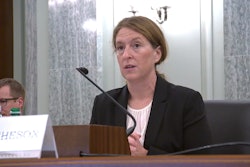Trucking news and briefs for Monday, June 13, 2022:
FMCSA requests public input on defining ‘broker,’ ‘bona fide agents’
In a Federal Register notice published Friday, the Federal Motor Carrier Safety Administration is requesting responses to a number of questions to help with future guidance on the definitions of “broker” and “bona fide agents.” The Biden administration’s Infrastructure Investment and Jobs Act (IIJA) requires FMCSA to issue guidance on the topic by Nov. 15.At her nomination hearing last week, FMCSA Acting Administrator Robin Hutcheson said her agency was close to seeking public comment on the topic as Sen. Deb Fischer (R-Nebraska) told Hutcheson she was preparing to reintroduce the Transportation and Logistics Hiring Reform Act, originally introduced in 2017, which she said would create a national hiring standard for how shippers and brokers hire motor carriers.
FMCSA said it has received numerous inquiries and several petitions over the last decade related to the definition of a broker, and the agency acknowledged “that there is significant stakeholder interest in FMCSA’s unauthorized brokerage enforcement.”
The IIJA requires that, in issuing guidance, FMCSA take into consideration the extent to which technology has changed the nature of freight brokerage, the role of bona fide agents, and other aspects of the trucking industry. Additionally, FMCSA said it must, at a minimum, examine the role of dispatch services, examine the extent to which dispatch services could be considered brokers or bona fide agents, and clarify the level of financial penalties for unauthorized brokerage activities applicable to a dispatch service.
Currently, “broker” is defined in 49 U.S.C. 13102(2) as a “person, other than a motor carrier or an employee or agent of a motor carrier, that as a principal or agent sells, offers for sale, negotiates for, or holds itself out by solicitation, advertisement, or otherwise as selling, providing, or arranging for, transportation by motor carrier for compensation” and in 49 CFR 371.2(a) as a “person who, for compensation, arranges, or offers to arrange, the transportation of property by an authorized motor carrier. Motor carriers, or persons who are employees or bona fide agents of carriers, are not brokers within the meaning of this section when they arrange or offer to arrange the transportation of shipments which they are authorized to transport and which they have accepted and legally bound themselves to transport.”
“Bona fide agents” are defined as “persons who are part of the normal organization of a motor carrier and perform duties under the carrier’s directions pursuant to a preexisting agreement which provides for a continuing relationship, precluding the exercise of discretion on the part of the agent in allocating traffic between the carrier and others.”
FMCSA is asking for public comment on the following 13 questions, and requests that commenters identify the question they are responding to in each section of their comments:
- What evaluation criteria should FMCSA use when determining whether a business model/entity meets the definition of a broker?
- Provide examples of operations that meet the definition of broker in 49 CFR 371.2 and examples of operations that do not meet the definition in 49 CFR 371.2.
- What role should the possession of money exchanged between shippers and motor carriers in a brokered transaction play in determining whether one is conducting brokerage or not?
- How would you define the term dispatch service? Is there a commonly accepted definition? What role do dispatch services play in the transportation industry?
- To the best of your knowledge, do dispatch services need to obtain a business license/Employer Identification Number from the State in which they primarily conduct business?
- Some “dispatch services” cite 49 CFR 371.2(b) as the reason they do not obtain FMCSA brokerage authority registration in order to conduct their operations. Section 371.2(b) states that bona fide agents are “persons who are part of the normal organization of a motor carrier and perform duties under the carrier’s directions pursuant to a pre-existing agreement which provides for a continuing relationship, precluding the exercise of discretion on the part of the agent in allocating traffic between the carrier and others.” Some dispatch services interpret this regulation as allowing them to represent more than one carrier yet not obtain broker operating authority registration. Others interpret this regulation to argue that a dispatch service can only represent one carrier without obtaining broker authority. What should FMCSA consider when determining if a dispatch service needs to obtain broker operating authority?
- If a dispatch service represents more than one carrier, does this in and of itself make it a broker operating without authority?
- When should a dispatch service be considered a bona fide agent?
- When should a dispatch service be considered a bona fide agent? What role do bona fide agents play in the transportation of freight?
- Electronic bulletin boards match shippers and carriers for a fee. The fee is a membership fee to have access to the bulletin board information. Should electronic bulletin boards be considered brokers and required to register with FMCSA to obtain broker operating authority? If so, when and why?
- How has technology changed the nature of freight brokerage, and how should these changes be reflected, if at all, in FMCSA’s guidance?
- Are there other business models/services, other than dispatch services and electronic bulletin boards, that should be considered when clarifying the definition of broker?
- Are there other aspects of the freight transportation industry that FMCSA should consider in issuing guidance pertaining to the definitions of broker and bona fide agents?
Comments can be made here through July 11.
Investment firms add truck terminals to portfolio
Alex. Brown Realty and Biynah Industrial Partners, via their joint venture, have acquired a 44-dock door truck terminal in Kansas City, Missouri, a two-building 46-dock door truck terminal in St. Paul, Minnesota, a 42-dock door truck terminal in Rock Island, Illinois, and a 46-dock door truck terminal located in Louisville, Kentucky.
The companies continue to expand their portfolio of truck terminals and high flow-through industrial assets with a portfolio that currently includes 11 assets with a total of 465 dock doors located throughout the Midwest.
“We are an active buyer of transportation related industrial properties nationwide,” said Jeff Josephs, Managing Partner at BIP. “We have several assets currently under contract and the acquisition pipeline is robust."
“The acquisition pace is off to a good start. We anticipate the portfolio will provide strong diversification by geography, tenancy and lease term,” said Tom Burton, Senior Managing Director and CIO of ABR.
Alex. Brown Realty is an independent real estate investment manager specializing in value-add, opportunistic, and core-plus investments in the middle market. Biynah Industrial Partners is a Minneapolis-based private equity firm that makes direct investments in industrial real estate located throughout the United States.











